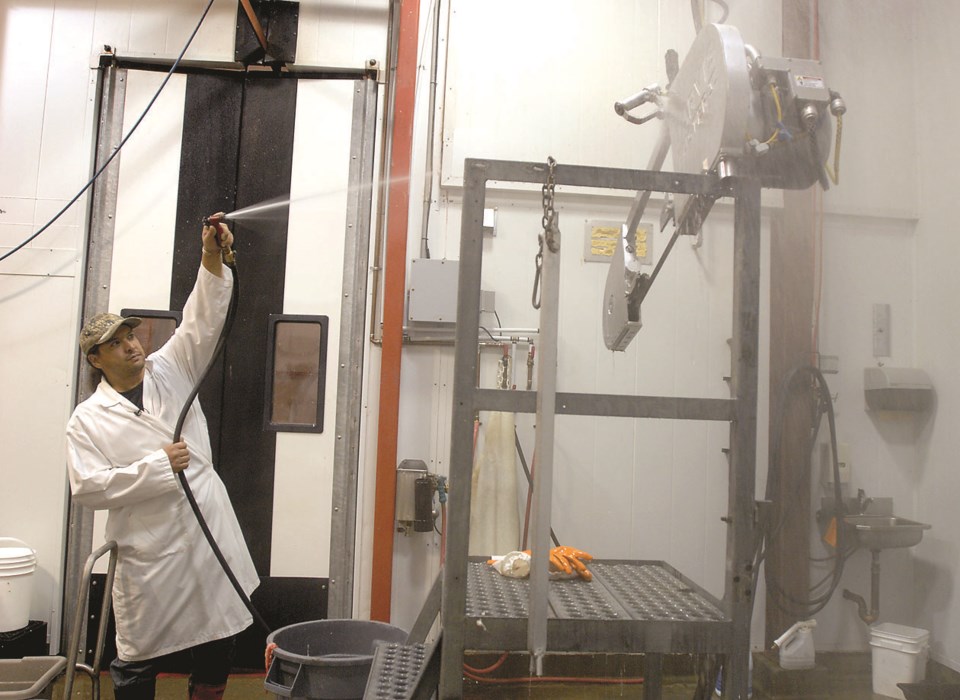When meat goes bad in a slaughterhouse but still manages to leave the factory for store shelves, there's a system in place to track the meat and protect the public.
Retail stores and restaurants across the country have been using those tracking numbers the past few weeks to determine if any of the beef they stock is on the Canadian Food Inspection Agency's list of meat products sent by XL Foods Ltd. of Brooks, Alta.
Larry Noulett, co-owner of Kawano Farms Ltd., hasn't had E. coli outbreaks at his small abattoir south of the Prince George city limits off Highway 97, but if he did, he said it wouldn't be hard to find where that meat was sent.
"Canada has a tracking system where they can track everything they've done, the same as us, and that number goes out the door with every package we send out of here -- it's similar to what they have [at XL Foods], but on a smaller scale," said Noulett.
"Canada has one of the best inspection systems in the world, but things can happen. And when it does happen, we know where it is and where it went."
Kawano Farm slaughters and processes domesticated animals, such as cows, pigs, lamb, goats and buffalo, and the owners of those animals fill their own freezers with the meat or sell it in farmer's markets. Processing an average 20 animals per six-hour shift and about 40 per week, Kawano employs a federally-trained meat inspector to examine the meat. Kawano and The Country Locker in Vanderhoof are the only government-inspected meat plants in the area.
"We're more of a hands-on operation here, so we're pretty particular in how we slaughter," said Noulett.
"[XL Foods] has a pretty strict inspection system there too and I guess it just happens, like an airplane crash. When you're doing that many animals [2,500 cattle per day] and you have that many employees [more than 2,000 people work at XL Foods], something goes by the inspectors. It just happens."
Alberta is home to the two largest slaughterhouses in Canada -- XL Foods and Cargill Beef of High River -- and most B.C.-grown cattle are sent to either of the two for processing. Small butchers buy large sides of beef, usually from local producers, and do all the processing themselves, working in small areas where it's easier to minimize the risk of contamination.
"Companies get so big, and I think cleanliness is a big part of it," said Ben Klassen, owner of Homesteader Meats in Prince George.
"Having been at this over 50 years I've seen a lot going on. When you work for a small company you can catch things pretty quick, but if you're working in a large facility it's hard to get on top of everything. I think what helps me is I have many years of experience and I'm really cautious to make sure when it arrives that everything is clean."
One local butcher for a small local retailer said the problem XL Foods now faces stems from the fact most of the larger retailers and restaurant chains no longer hire butchers to make their own ground beef. Instead, it's made at the large plants, using automated machines. As a former slaughterhouse employee, he said sometimes all it takes to trigger an E. coli outbreak is if the cow's gut or intestine is ruptured or if the cow slips and falls and feces gets dropped on the slaughter line.
"The big places have machines doing it, and machines don't know a thing about quality control," said the butcher, who requested anonymity.
"If you're killing 6,000 beef in a shift, you can't inspect it when it's moving that fast. It's the same thing that happened in the listeria [outbreak] at Maple Leaf Foods [in 2008]. The cleaning equipment was faulty but it's mechanical, so nobody is going in and checking because it costs money to have people do that. When you take people out of it, it really makes for a bad scenario. It's a lack of human control."
Problems associated with big packing plants and massive recalls shatter consumer confidence in the meat industry and everybody suffers, says Chilako Meats co-owner Alan McCloud.
"People are scared -- a lot of them are emptying their freezers saying, 'I'm not going to eat that,' and you really can't blame them," said McCloud. "We've only had one customer phone us and ask where we buy our products and I said he has nothing to worry about, we don't have any [XL Foods products].
"With the old-fashioned ways, the way they used to do it, we never heard of this stuff. Now we have all this fancy machinery and it seems like we're having all these problems. It's going to stick in a lot of people's minds and they'll be a bit shy of that now."


